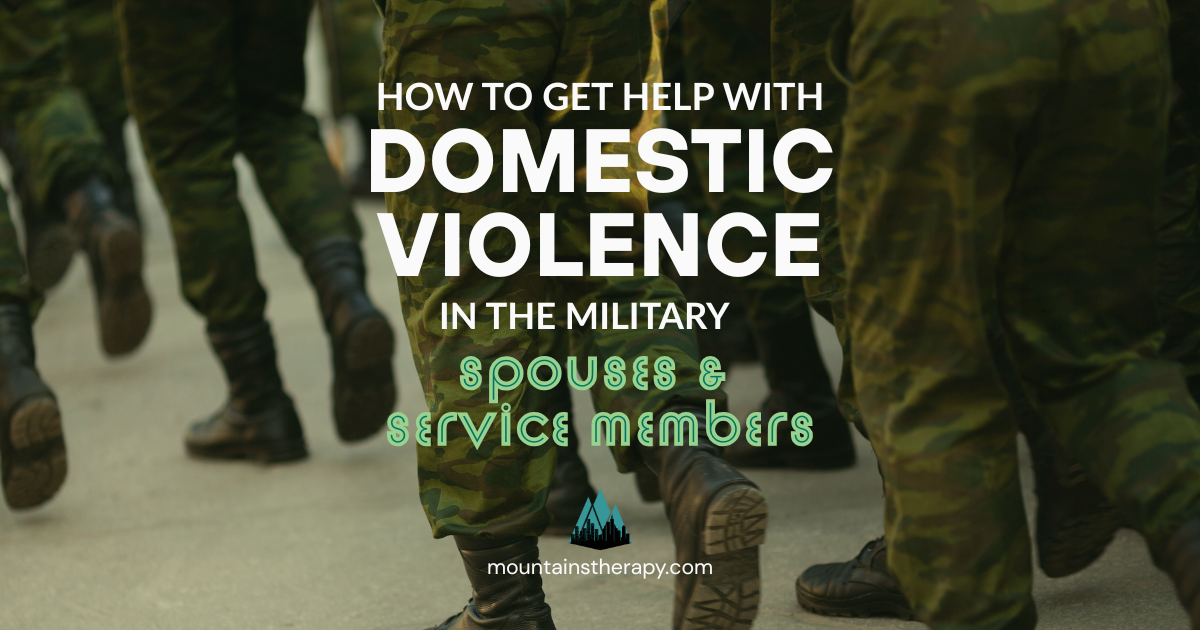How to Get Help for Domestic Violence in the Military: A Step-by-Step Guide for Service Members, spouses and Families
Learn more about Individual Therapy in Montclair, NJ.
In This Blog, You’ll Learn:
✅ How the military handles domestic violence cases.
✅ What to do if you’re in danger and need help fast.
✅ Your rights to legal and financial protection.
✅ Where to find free and confidential therapy on or off base.
✅ How TRICARE and BAH support survivors.
✅ What therapies help with recovery and trauma.
✅ Answers to common military domestic violence FAQs.
🚨 Step 1: Recognize the Signs of Military Domestic Violence
Military domestic violence looks similar to civilian abuse — but can be complicated by rank, deployment, and financial dependency.
Common signs include:
- Physical abuse: Hitting, restraining, or threats of harm.
- Emotional abuse: Insults, humiliation, gaslighting, or intimidation.
- Financial abuse: Withholding money or controlling Basic Allowance for Housing (BAH).
- Sexual coercion: Forcing intimacy or using guilt for sexual control.
- Psychological control: Using rank, authority, or command power to intimidate.
💡 Military-specific red flags: Controlling your ID card, paycheck, or threatening to report you to command.
If you constantly feel unsafe, fearful, or isolated, you may be experiencing militarydomesticviolence.
🧭 Step 2: Get to Safety
If you’re in immediate danger, your safety comes first.
✅ Go to a secure location that they do not know about: a friend’s home, the Family Advocacy Office, or on-base emergency housing.
✅ Call
911 immediately.
✅ Contact the
DoD Safe Helpline (1-877-995-5247) for 24/7 confidential support.
✅ Reach out to your
Victim Advocate for transportation, emergency lodging, or medical care.
✅
Bring important documents with you: ID, phone, medication, financial documents, and children’s records.
⚖️ Step 3: Understand How the Military Handles Domestic Violence
Many survivors wonder, how does the military handle domestic violence? Each branch follows the Uniform Code of Military Justice (UCMJ) and has investigative and support systems.
- Victims’ Legal Counsel (VLC/SVC): Lawyers who represent you, not your command.
- Military Protective Orders (MPOs): Issued by command to restrict an abuser’s contact on base.
- Family Advocacy Program (FAP): Provides therapy, prevention classes, and intervention.
- Investigations:
- NCIS (Navy/Marines), CID (Army), or OSI (Air Force) handle domestic violence cases.
- Restricted reports allow confidential help; unrestricted reports start official investigations.
- File with local police to create a civilian record and qualify for restraining orders.
- Victim Advocates: They offer confidential help with housing, safety, and referrals.
💰 Step 4: Protect Your Finances and Housing (BAH)
Financial control is a common form of abuse. If your partner withholds BAH (Basic Allowance for Housing) or financial support:
- ✅ Report it to their
command they can issue a
mandatory support order requiring payment.
✅ Work with your Victim Advocate and Victim lawyer to document the issue.
✅ Open a separate bank account for your BAH.
✅ Save proof of nonpayment and communication records.
✅ Ask the Family Advocacy Program or Military OneSource for budgeting and support. - This ensures you receive your share of BAH so you can stay financially stable and safe.
🧾 Step 5: What to Do Right Now or in the future
✅ Get to a safe location and contact a Victim Advocate.
✅ Call
DoD Safe Helpline (1-877-995-5247) or
National Domestic Violence Hotline (1-800-799-SAFE).
✅ Call
911 or
military police if in immediate danger.
✅ Request a
Military Protective Order (MPO) or
civilian restraining order.
✅ Report to
command for financial and housing protection.
✅ Gather important documents and evidence.
✅ Contact
Legal Assistance or
VLC/SVC for legal help.
✅ Schedule therapy for trauma recovery.
💡 How to Report Domestic Violence: Best Practices
When it’s safe to do so, report to both civilian police and military systems to ensure full legal protection and documentation.
Civilian Report:
- Contact local law enforcement to file a police report and request a civilian restraining order.
- This creates a public legal record and ensures civilian courts can enforce firearm restrictions or custody protections.
Military Report:
- Notify the command, NCIS (Navy/Marines), CID (Army), or OSI (Air Force) to begin a military investigation.
- Military reports ensure accountability under the Uniform Code of Military Justice (UCMJ) and trigger protective actions on base.
The Difference Between Military and Civilian Domestic Violence Reporting:
- Military domestic violence reporting systems often focus on administrative or disciplinary actions, such as counseling, issuing a Military Protective Order (MPO), reassignment, or temporary duty changes for the accused service member.
- Civilian domestic violence police reports, on the other hand, can press criminal charges, issue restraining orders, and enforce firearm surrender under state and federal law.
⚠️ Important: Reporting only within the military may lead to internal consequences but does not create a civilian criminal record or guarantee long-term protection outside of the military system.
🔫 How guns / Firearms Are Handled in Domestic Violence Cases
Firearms are a major safety concern in both civilian and military domestic violence situations. Here’s how they are managed:
In Military Domestic Violence Cases:
- Once a protective order or domestic violence finding is made, a service member’s firearm access can be suspended or revoked by command.
- The individual may be temporarily reassigned to non-armed duties during investigations or legal proceedings.
- Military-issued firearms are turned over to the unit armory for safekeeping until restrictions are lifted.
In Police Civilian Domestic Violence Cases:
- Under the Lautenberg Amendment and most state laws, anyone under a civilian restraining order or convicted of domestic violence cannot possess or purchase firearms.
- Civilian courts can order the surrender of personally owned weapons to local law enforcement.
💡 Reporting Domestic Violence of Service Members: When filing for a restraining order, specifically request that firearm surrender be included in the court order for your safety.
Does a Military Protective Order (MPO) Automatically Take Away Firearms?
No, a Military Protective Order (MPO) does not automatically require the service member to surrender their firearms.
- MPOs are administrative orders, issued by a commanding officer, not a court.
- Because MPOs are not court orders, they do not automatically trigger the firearm restrictions under the Lautenberg Amendment or federal domestic violence laws.
- However, a commander can choose to restrict or suspend a service member’s access to government-issued weapons (such as turning them in to the armory).
- Personally owned firearms are not automatically removed under an MPO unless there’s also a civilian restraining order or court action requiring it.
💡 To ensure full firearm restriction:
- File a civilian restraining order in addition to an MPO. Civilian courts have the legal authority to mandate firearm surrender and notify law enforcement.
- Victim Advocates or Family Advocacy Program staff can help survivors safely file for civilian protection while maintaining military safety measures.
🪖 Free & Confidential Therapy Options on Base and Off Base
You don’t have to wait or go through command to start therapy — here are free and confidential options available now.
1. Military & Family Life Counseling (MFLC) Program
The MFLC Program offers FREE, confidential therapy for service members, spouses, and families.
- No medical record entry or diagnosis.
- Only minimal notes for usage tracking.
- Meet in person, virtually, or at a neutral location.
- Helps with stress, anger, trauma, deployment, and relationships.
💡 Completely confidential unless there’s risk of harm to self or others.
Contact your Military & Family Support Center or Family Advocacy Program to find your local MFLC.
2. Family Advocacy Program (FAP)
The FAP provides free therapy, intervention, and education for domestic violence and family stress.
- Individual, couples, and family counseling.
- Safety planning and command coordination.
- Specialized in military domestic violence and trauma.
Reach your base’s FAP through the Family Support Center or call your branch hotline.
3. Civilian Therapy Options (Through TRICARE)
If you prefer off-base therapy for privacy, TRICARE covers counseling with a referral.
✅ T Military spouses can request this referral
confidentially, without their active-duty partner or service member being notified.
✅ Meet with your
Primary Care Manager (PCM) or
doctor off base to request a
TRICARE referral for mental health counseling.
✅ Once approved, choose a licensed civilian therapist.
✅ TRICARE will cover all or most costs, depending on your plan.
🧠 Step 6: How Therapy Helps With Military Domestic Violence
At Mountains Therapy, we provide trauma-informed therapy tailored for survivors of militarydomesticviolence including active-duty members, spouses, and veterans.
- ACT – Acceptance Commitment Therapy for Domestic Violence: Builds resilience through acceptance and mindfulness.
- CBT – Cognitive Behavioral Therapy for Domestic Violence: Reduces fear, guilt, and intrusive thoughts.
- DBT – Dialectical Behavioral Therapy for Domestic Violence: Improves emotional control and distress tolerance.
- EFT – Emotionally Focused Therapy for Domestic Violence: Helps couples rebuild trust and safety.
- MBT – Mindfulness-Based Therapy for Domestic Violence: Promotes calm and grounding after trauma.
- Narrative Therapy for Domestic Violence: Reframes your story from harm to healing.
- Psychodynamic Therapy for Domestic Violence: Explores early attachment and trauma patterns.
- SFT – Solution Focused Therapy for Domestic Violence: Builds small, achievable steps for recovery.
- TF-CBT – Trauma Focused Cognitive Behavioral Therapy for Domestic Violence: Supports children and adults recovering from abuse.
🌿 Resources for Military Spouses of Domestic Violence and Service Members
- DoD Safe Helpline: 1-877-995-5247 (24/7 confidential support)
- Family Advocacy Program (FAP): Local base support services (classes and free therapy)
- Victims’ Legal Counsel (VLC/SVC): Free legal representation for spouses (the FAP can help you get connected to one)
- Military OneSource: 1-800-342-9647 (confidential counseling)
- National Domestic Violence Hotline: 1-800-799-SAFE (7233) | thehotline.org
- Local Police: For civilian restraining orders and documentation
❓ FAQs About Military Domestic Violence and Getting Help
💚 You Are Not Alone
If you’re wondering
how to get help for domestic violence in the military, know that confidential support is available —
on base,
off base, and
right now. At
Mountains Therapy in Montclair, NJ, we provide fee based, out of network, compassionate, trauma-informed care for survivors of military and civilian domestic violence. You deserve safety, stability, and healing.














